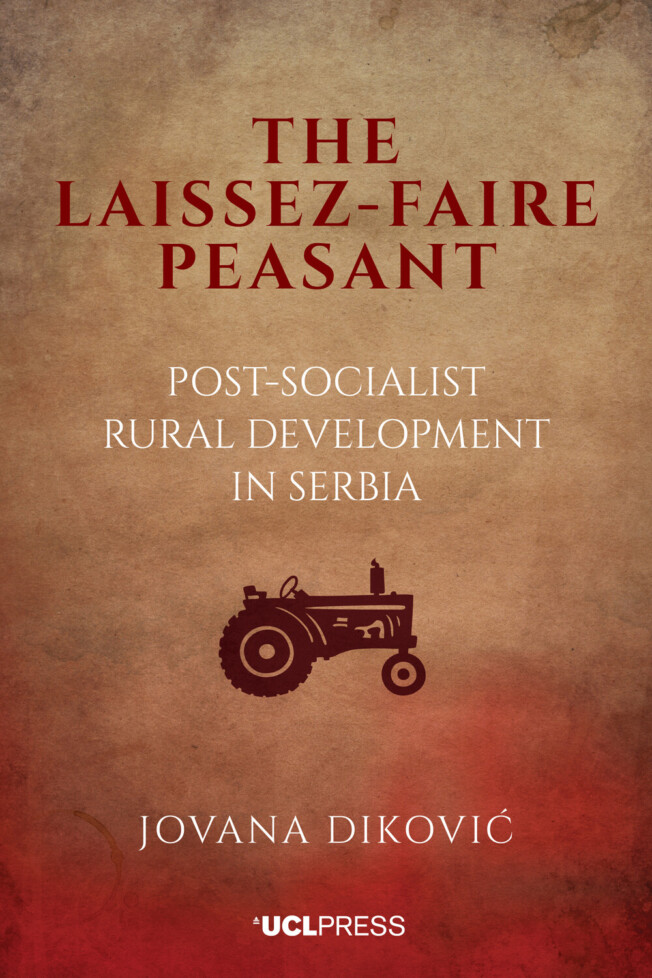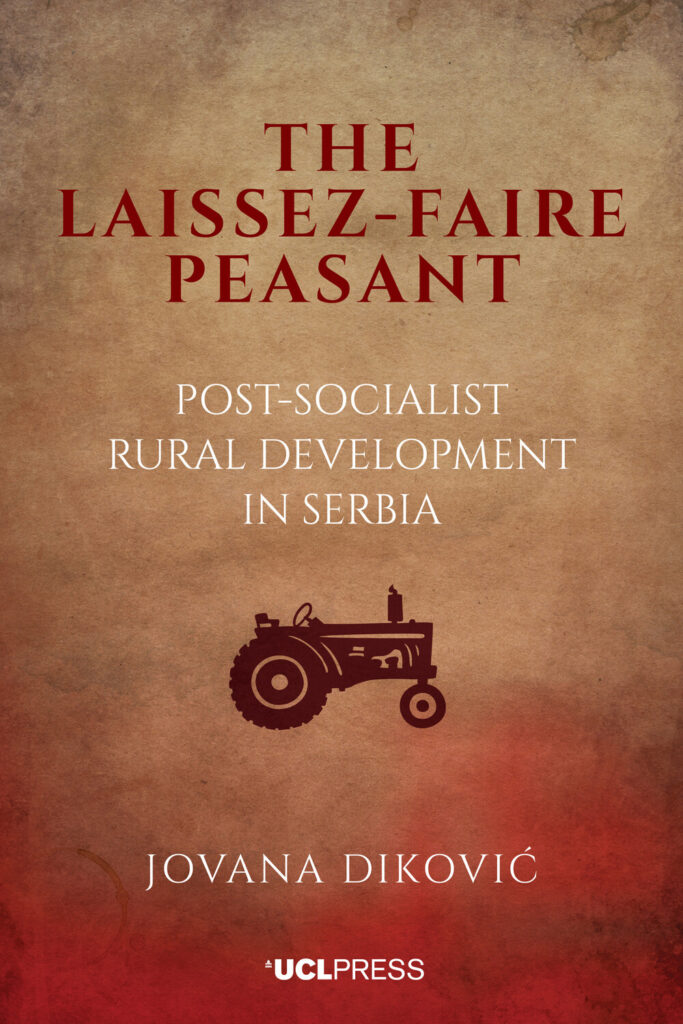
The Laissez-Faire Peasant
Post-socialist rural development in Serbia
Jovana Diković (Author)
In rural development studies there are two mainstream assumptions. One holds that peasants are the victims of state rural development schemes, the other that only planning can ensure change and prosperity in rural regions. It is rarely considered that peasants are architects of their own and local wellbeing – notions which are often in opposition to state plans for agriculture.
The Laissez-Faire Peasant explores how rural development emerges on the ground. The concept involves the manifestation of peasant worldviews in which autonomy in decision-making, freedom of action, spontaneity, and flexibility in everyday cooperation play a dominant role. A role in which individual and local values generate a self-regulating system that manages a range of economic, social, and political relationships. The book examines manifestations of peasant autonomy, both in response to and independent of state rural development policies through a multi-sited ethnography of three Serbian villages. It is shown how these factors impede state programs for rural development while enabling the spontaneous flourishing of local communities. By focusing on the agency of rural residents, the book finds that peasants are resilient and competent agents who do not need government plans to thrive.
List of figures
List of tables
Glossary
Acknowledgements
1 The laissez-faire mentality: toward an understanding of peasant resilience, autonomy and institutional change
2 Peasants in theoretical and historical perspective
3 Nesting the laissez-faire mentality
4 Laissez-faire practices versus rural development policies
5 Local politics and rural development
6 Whose rural development?
7 Roma and rural development
8 Conclusion
References
Index
DOI: 10.14324/111.9781800087637
Number of illustrations: 24
Publication date: 14 January 2025
PDF ISBN: 9781800087637
EPUB ISBN: 9781800087644
Hardback ISBN: 9781800087590
Paperback ISBN: 9781800087620
Jovana Diković (Author)
Jovana Diković is an economic anthropologist, publicist, and Head of Sustainable Development and Inclusive Growth at the Center for Corporate Responsibility and Sustainability, School of Management, Fribourg.
‘A captivating read that… provides a comprehensive and detailed exploration of aspects making a local community tick. By doing so, it allows the reader to observe the profoundly entrenched contradictions that govern communities similar to the one, presented in the book. This is a book to read if you are looking for a better understanding of rural challenges in a post-socialist setting.’
Sociologia Ruralis
‘The contribution of… The Laissez-Faire Peasant… to contemporary anthropology is evident on multiple levels …The book advances the understanding of contemporary rural transformation processes by analyzing how post-socialist economic changes shape rural capitalism, including new economic activities such as informal labor, migration, and temporary work abroad. As such, it merits inclusion among works that shape contemporary anthropological literature and studies on post-socialist rural development.’
Antropologia
‘The presented research aims to deconstruct the victimization discourse on peasantry prevalent in post-socialist Serbia and provide evidence to the contrary—that peasants are the creative builders of their life destiny and communities.’
Zlatina Bogdanova, Balkanistic Forum
‘The Laissez-Faire Peasant is a deeply empirically based, theoretically innovative, and intellectually provocative study. Author Jovana Diković succeeds in dismantling entrenched notions of peasants as passive losers of transition and shows their resilience, autonomy, and ability to build their own paths of development through values and ethics… The book is valuable for anthropologists, sociologists, researchers of rural development, and all those who reflect on the relations between state and society in post-socialist and peripheral contexts.’
Bulletin of the Institute of Ethnography SASA
‘Anthropologists and missionaries claim to love their peasants. Economists and planners claim to help them. Both look down. Diković brilliantly proposes a new approach, which might be called “humanomics’’. It gives respect, looking up from where people actually live.’
Deirdre Nansen McCloskey, University of Illinois at Chicago
‘This is an ethnographically rich and conceptually original study of post-socialist peasantry and rural development in Serbia. Jovana Diković draws a complex picture of the post-socialist peasants as autonomous and resilient subjects motivated by the visions of rural development anchored in their local lifeworlds.’
Agnieszka Joniak-Lüthi, University of Fribourg
‘In her excellent study Jovana Diković challanges the narrative about Serbian peasants usually viewed as downtrodden and exploited underdogs in need of governmental help. In this careful case study, these peasants represent an entrepreneurial, self -reliant and individualistic social group that can survive and thrive even in the conditions of modern and technologically advanced capitalism.’
Ivan Janković, Institut auf dem Rosenberg
Related titles
Postcapitalist Countrysides
Nick Gallent, Menelaos Gkartzios, Mark Scott, Andrew Purves,
06 February 2025
The Laissez-Faire Peasant
Post-socialist rural development in Serbia
In rural development studies there are two mainstream assumptions. One holds that peasants are the victims of state rural development schemes, the other that only planning can ensure change and prosperity in rural regions. It is rarely considered that peasants are architects of their own and local wellbeing – notions which are often in opposition to state plans for agriculture.
The Laissez-Faire Peasant explores how rural development emerges on the ground. The concept involves the manifestation of peasant worldviews in which autonomy in decision-making, freedom of action, spontaneity, and flexibility in everyday cooperation play a dominant role. A role in which individual and local values generate a self-regulating system that manages a range of economic, social, and political relationships. The book examines manifestations of peasant autonomy, both in response to and independent of state rural development policies through a multi-sited ethnography of three Serbian villages. It is shown how these factors impede state programs for rural development while enabling the spontaneous flourishing of local communities. By focusing on the agency of rural residents, the book finds that peasants are resilient and competent agents who do not need government plans to thrive.
‘A captivating read that… provides a comprehensive and detailed exploration of aspects making a local community tick. By doing so, it allows the reader to observe the profoundly entrenched contradictions that govern communities similar to the one, presented in the book. This is a book to read if you are looking for a better understanding of rural challenges in a post-socialist setting.’
Sociologia Ruralis
‘The contribution of… The Laissez-Faire Peasant… to contemporary anthropology is evident on multiple levels …The book advances the understanding of contemporary rural transformation processes by analyzing how post-socialist economic changes shape rural capitalism, including new economic activities such as informal labor, migration, and temporary work abroad. As such, it merits inclusion among works that shape contemporary anthropological literature and studies on post-socialist rural development.’
Antropologia
‘The presented research aims to deconstruct the victimization discourse on peasantry prevalent in post-socialist Serbia and provide evidence to the contrary—that peasants are the creative builders of their life destiny and communities.’
Zlatina Bogdanova, Balkanistic Forum
‘The Laissez-Faire Peasant is a deeply empirically based, theoretically innovative, and intellectually provocative study. Author Jovana Diković succeeds in dismantling entrenched notions of peasants as passive losers of transition and shows their resilience, autonomy, and ability to build their own paths of development through values and ethics… The book is valuable for anthropologists, sociologists, researchers of rural development, and all those who reflect on the relations between state and society in post-socialist and peripheral contexts.’
Bulletin of the Institute of Ethnography SASA
‘Anthropologists and missionaries claim to love their peasants. Economists and planners claim to help them. Both look down. Diković brilliantly proposes a new approach, which might be called “humanomics’’. It gives respect, looking up from where people actually live.’
Deirdre Nansen McCloskey, University of Illinois at Chicago
‘This is an ethnographically rich and conceptually original study of post-socialist peasantry and rural development in Serbia. Jovana Diković draws a complex picture of the post-socialist peasants as autonomous and resilient subjects motivated by the visions of rural development anchored in their local lifeworlds.’
Agnieszka Joniak-Lüthi, University of Fribourg
‘In her excellent study Jovana Diković challanges the narrative about Serbian peasants usually viewed as downtrodden and exploited underdogs in need of governmental help. In this careful case study, these peasants represent an entrepreneurial, self -reliant and individualistic social group that can survive and thrive even in the conditions of modern and technologically advanced capitalism.’
Ivan Janković, Institut auf dem Rosenberg

